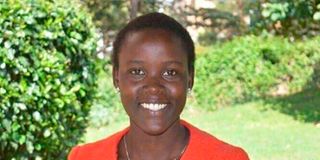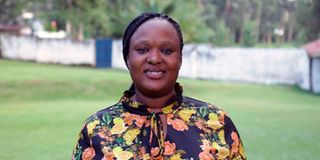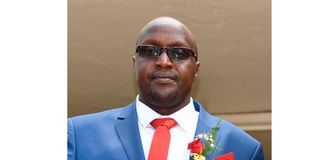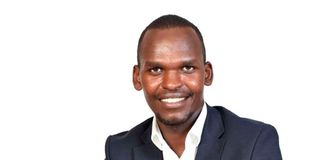
The youth queue to register as voters in Eldoret on November 1, 2021.
| Jared Nyataya | Nation Media GroupPolitics
Premium
Ballot revolution? Many youth to vie for political seats in 2022 elections
More youthful aspirants are eyeing positions in next year’s elections, banking on their peers who constitute the majority of voters, and hoping to break the jinx of their dismal performance.
In 2017, the youth accounted for more than half (51 per cent) of the 19.6 million registered voters and their share is expected to increase significantly following new registrations.
Of an extra 1.5 million new registrations, most are likely to be young voters, although their disinterest in electoral affairs was evident given the electoral commission had targeted six million.

However, as the last elections showed, the fact that the youth, defined in the Constitution as those aged between 18 and 35 years, are the majority registered voters doesn’t necessarily mean victory for youthful aspirants.
In the 2017 General Election, 3,428 youthful candidates vied for the various elective positions, but only 314—less than 10 per cent—won.
Nandi Governor Stephen Sang, six senators, 20 members of National Assembly and 287 members of county assemblies were the only ones who triumphed despite the youth commanding over half of the total number of registered voters.
Still, youthful aspirants were less than a quarter of the total number of candidates (14,523) who contested in the August 8, 2017 General Election, underlining the indifference of young people to governance.
In the run-up to next year’s elections, the youth of voting age constitute 14.6 million or a third of the country’s 47.6 million population as per the 2019 Census. But considering children below 18 years were 21.7 million by 2019 when the Census was done, there have been more births since then.
Together with the 14.6 million, it means that at least 76 per cent of the country’s population is young.
Despite constitutional and legal provisions to promote youth participation in governance — the Constitution stipulates that the youth shall be represented at the National Assembly, Senate and at the county assemblies — their representation continues to be underwhelming.
The youth have two specific nomination slots in the Senate.
In National Assembly, there are 12 slots for parties to nominate, according to their proportion of members of the National Assembly, to represent special interests, including the youth, persons with disabilities and workers.
Article 100 stipulates Parliament shall enact legislation to promote the representation in Parliament of women, persons with disabilities, youth, ethnic and other minorities, and marginalised communities.
The expensive nature of campaigns and discrimination by parties are among reasons that discourage youth and women from running for office, according to a survey by The Carter Centre in 2018.
Those interviewed said running for office is expensive, which particularly disadvantages youth and women, as they are hard hit by high unemployment and lack property to give as collateral to secure loans.
The rampant vote buying and bribery prevalent in Kenyan elections further disadvantage youth and women aspirants of limited means.
Moneyed politicians prey on the desperation of jobless youth to pay them peanuts as protesters and to intimidate opponents.
To buttress the view electoral seats are won by politicians with deep pockets, another study found winning candidates in the 2017 elections spent as much as three times the losers.
The Senate seat was considered the most expensive position to campaign for, with one senator admitting to spending Sh100 million, according to ‘The cost of politics in Kenya: Implications for political participation and development’ published by Karuti Kanyinga and Tom Mboya in July, this year.
According to the Carter Centre’s report titled ‘Youth and women’s consultations on political participation in Kenya’, political parties also often hinder their participation.
“As such, the Center encourages parties to reform and strengthen their internal structures to increase the number of youth and women party members and decision-makers. Political parties should develop affirmative-action measures to help level the playing field for youth and women aspirants,” the report says.
To demonstrate the youth’s ambivalence towards vying for positions, while more than 90 per cent of participants said they voted, less than 40 per cent ran for office or participated in public forums, according to the report.
University of Nairobi’s Prof Karuti Kanyinga told Daily Nation in a recent interview the youth vote will be the make-or-break in 2022.
“Politicians must be worried if they fail to mobilise as many youth as possible when going into next year’s polls. The youth are the movers and shakers of the next election because of their big numbers. We have seen what they have done in recent by-elections,” said Prof Kanyinga, who is attached to the university’s Institute for Development Studies.
“The younger people are the majority but a good number of them don’t understand that they have the power to change the country,” Prof Egara Kabaji of Masinde Muliro University also said in a recent interview.
Maryam Abubakar, 28 (Lamu Woman Rep)

Maryam Abubakar.
Born in Mkomani, Lamu Island, Maryam Abubakar, 28, went to Mkomani Primary School in Old Town before joining Loreto Girls in Limuru. She earned an accounting degree from Moi University and is a Master’s student in Strategic Management at the University of Nairobi.
She wants to vie for the Lamu woman representative seat in the 2022 General Election on a United Democratic Alliance (UDA) party ticket.
Her vision is to have all women, youth and people with disabilities fully empowered. She also wants to create jobs for young people and women .
“My dream is to see our people informed and empowered,” she said.
She runs her own company, Myra Botanics, which deals in fashion and cosmetics.
This is not the first time she is running for the woman rep seat in Lamu, having tried her luck in the 2017 elections. She lost to the incumbent, Ruweida Obbo, of Jubilee. “I believe in myself. I have all the leadership qualities that the people of Lamu deserve. I hope that this time around, the people of Lamu will elect me,” she said. — Kalume Kazungu
Mohamed Bahaidar, 33, is seeking to succeed Mombasa Governor Hassan Joho

Dr Mohammed Bahaidar.
“We’ve reached a point whereby we rely on salty water in our homes. Businesses are on their deathbed. We have schools but no education, and healthcare is poor,” he said in an interview.
“There are lots of challenges. What will be the fate of our children if we fail to solve them and I have that solution?”
The human psychology scholar, who has authored six books, will fight it out with former Mombasa senator Omar Hassan for the United Democratic Alliance (UDA) ticket.
Mr Bahaidar said UDA is in sync with his ideals for a better Mombasa County.
“UDA has come up with a concept that I believe in. We have to focus more on the common citizens if we want to improve our economy for the benefit of all,” he said.
Although Deputy President William Ruto hinted at supporting Mr Hassan in his recent Coast campaigns, Mr Bahaidar played it down, insisting that he believes there will be fair nominations. — Valentine Obara
Sam Omwoyo Areba, 30 (MP, Kitutu Masaba)

Omwoyo Areba.
The lawyer wants to run for MP of Kitutu Masaba in Nyamira County.
Mr Areba, who has practised for three years, will gun for the seat on DP Ruto’s United Democratic Alliance (UDA) party ticket.
He said most young people only complain about Kenya’s problems on WhatsApp and he will no longer take a back seat. He wants to focus on uplifting the education standards because the constituency is one of those still with mud-walled schools.
He also said that most children in the area miss school because of lack of basic things like food, pencils and uniforms. “I want many of my constituents to also be where I am because of the efforts I will put in. If not for education, I wouldn’t be where I am today,” he said. — Collins Omulo
Joshua Kiptoo, 34 (Nandi governor)

Nandi County Assembly Speaker Joshua Kiptoo during a function in Kapsabet, Nandi County on June 09, 2019.
He is the current Nandi County Assembly Speaker and a fierce critic of Governor Stephen Sang. He wants to capitalise on the popularity he gained fixing issues in the assembly to be the next governor. He holds a Master’s degree in Law from the University of Nairobi and is an alumnus of Kapsabet Boys High School. “Having served as Speaker of the Nandi County Assembly since 2017, I’ve understood how devolution works and how it can transform the lives of our people, and that’s why I am interested in this seat so as to uplift their lives,” he said. — Onyango K’Onyango
Cynthia Muge Rotich-26 (Nandi Woman Rep)

Kilibwon MCA Cynthia Muge Rotich.
She is the current MCA for Kilibwoni ward and is out to unseat current woman rep Tecla Tum.
Ms Rotich holds a master’s degree in project management (physical planning) and has established herself as a great debater in the county assembly since she was elected in the last General Election.
She has championed fairness in the issuing of tenders in the devolved unit and gender equity. — Tom Matoke
Irene Chemutai, 34 (MP, Nandi Hills)

Irene Chemutai.
She is making her first stab at the Nandi Hills parliamentary seat now held by outspoken lawmaker Alfred Keter.
Ms Chemutai attended Nandi Hills Township Primary, Kemeloi Primary and Limuru Girls. She then joined Jomo Kenyatta University of Agriculture and Technology (JKUAT) to study food science and nutrition.
Among her priorities are youth empowerment, equality in the distribution of public resources and development in Nandi Hills constituency. — Tom Matoke
Dennis Ruto Kapchok -35 (Senate, West Pokot)

Dennis Ruto Kapchok.
The controversial politician, a major critic of Governor John Lonyangapuo’s administration, wants to unseat Senator Samuel Poghisio.
He holds an education degree from Makerere University in Uganda. Mr Kapchok said his objective is to push the youth agenda and ensure that the devolved unit gets more money for development. “I want to woo more investors to propel the economic growth and development of our county,” he said. He wants to vie on a United Democratic Alliance ticket. — Oscar Kakai.
Daniel Orogo, 33, (MP, Kibra)

Daniel Orogo.
He will vie for MP of Kibra in 2022 for the second time, having tried his luck in the 2019 by-election.
He says Kibra residents need proper representation and he will provide accountability and improve access to social services.
He was the founder of the Lang’ata Youth Network, a community youth-driven group started in 2010 to champion the interests of young people in Kibra. He is relying on his friends in Kenya and Denmark to fund his political campaigns.
He acknowledges the hurdles in the perception that Kibra is a stronghold of a certain party and that his rivals have huge campaign war chests, saying he will work extra hard to persuade voters that he is the right candidate. He is a political governance consultant, and a member of Amani National Congress party since 2020. — Mercy Chelangat
Brian Oluoch Awuonda,33, wants to be your president

Brian Oluoch Awuonda.
The advocate of the High Court plans to run for president as an independent candidate. “It is said in the Bible you should serve the Lord in the days of your youth. I could have gone for an MCA, MP or other seat but the same zeal and passion is the one I will employ here,” says Mr Awuonda. “The ideals I have cannot be fully implemented with any other seat,” he adds.
He is banking on funding by friends and so far he has Sh1 million but he is looking at raising Sh2 billion for his campaign. — Collins Omulo
Dorothy Nyangori, 32, has trained her eyes on State House

Dorothy Kemunto Nyangori
The 32-year-old businesswoman, who is still scouting for a political party, reckons she is the voice of reason that Kenya urgently needs to attain a double digit economic growth. “As a businesswoman I have the grip of the connection between the rule of law and a sustainable economy,” says the holder of a Master’s degree in Procurement and Logistics from Jomo Kenyatta University of Agriculture and Technology. “Let Kenyans have a shift of mind and elect fresh leaders. We don’t have to recycle leaders.” — Moraa Obiria
John Muhia, 31, Senate - Nyandarua

John Muhia.
He is taking another stab after failing to clinch the seat on a Maendeleo Chap Chap ticket in 2017. He emerged second after Mwangi Githiom, the sitting senator.
The farmer at Njabini in Kinangop is personal assistant to embattled Nyandarua Speaker Wahome Ndegwa. “I am passionate about community service, I sit in several boards of management of several schools in Kinangop and Ol Kalou constituencies,” said Mr Methu.
He holds a degree in Political Science from Pwani University and plans to run on UDA ticket. — Waikwa Maina
Ibrahim Ngugi, 29, MP - Laikipia West

Ibrahim Ngugi.
The graduate of Laikipia University, who is currently farming tomatoes, says his dream is to touch and transform lives.
“Since I come from a humble background, I understand the issues that affect the residents,” says the former president of Laikipia University Student Organisation.
The youthful aspirant, targeting to run on The Service Party ticket, also wants to inspire fellow youth to take up leadership. — Steve Njuguna
Cynthia Kerubo Toel, 27, Kitutu Chache South MP

Cynthia Kerubo.
“I got inspired to go back and build my community after serving as a student leader at a public university and is enthusiastic about leadership,” says the mechanical engineering graduate from the Jomo Kenyatta University of Agriculture and Technology.
Cynthia aspires to serve as a good example to young women. “As a believer in good governance and a people-centred agenda, I have a deep strategy that emphasises development, education, empowerment and public participation.” — Ruth Mbula
Lawrence Munga Njoroge, 32, Maragua MP

Lawrence Munga.
An accountant and a trained political scientist with a master’s degree in Customs Management, Njoroge says he will offer leadership that bonds together both the young and the elderly to feel proud of his legislative agenda. “If we were to emphasise on youth employment, mentorship and guidance, we will be sealing the biggest threat that faces our country—a population of educated but jobless youth. These are the people who, in venting off their frustrations, join ranks with the non-skilled to form organised criminal networks,” he said. — Mwangi Muiruri
Dennis Chege, 25, Maragua MP

Dennis Chege.
A computer scientist by profession, he says his agenda would be youth empowerment, equitable and fair distribution of bursaries as well as ensure infrastructural development remains key. “The major problem that we have had over the years is that of politicians being elected and then disappearing from the ground only to come back to seek re-election,” he said.
Chege said his will be a transparent leadership regarding devolved funds, work closely with the government of the day both at the central and county levels. — Mwangi Muiruri
Winfred Asiko Abuti, 28, Kakamega Woman Rep

She runs the Annalisa Commercial Kitchen Professionals and is a director at the Ecofore Company.
“I train models and also teach German language to students and children in slums as part of my activities at the Winfred Asiko Abuti Foundation,” said Ms Abuti. She unsuccessfully contested for the Kilimani ward seat in Dagoreti North in 2017 polls. “I’m currently involved in campaigns in Kakamega County to address teenage pregnancy and gender-based violence. These are issues close to my heart.” — Benson Amadala
Mercy Luseno, 30, Kakamega Woman Rep

Although unsuccessful in 2017 when she vied on a Jubilee ticket, she hopes to clinch the seat on a UDA ticket . “When I joined politics in 2017, I was fresh from university and bubbling with energy. I ended up getting 40,000 votes which was quite encouraging. This time around I’m hoping to turn tables around since voters know me,” said Ms Luseno from Eshitukhumi village in West constituency. “My passion for politics is about the future of the youth. When you look around, there are many young people who are suffering because there is nobody to represent their issues. — Ian Byron
Valentine Otieno, 22, Kisumu Woman Rep

Valentine Otieno.
She says the county MP office should serve the youth and believes she is better placed to articulate the issues affecting young people.
The 2018/19 Miss University of Nairobi believes business incubation centres and life skills are key to creating jobs and enhancing the skills of the youth to make them relevant in the 21st Century job market.
“Having gone through the struggles of growing up as an orphan and as a youth, I believe that it is pertinent for the youth to stand up and influence government policies,” she says. — Rushdie Oudia
Edwin Murira, 30, Maragua MP

Edwin Murira.
He is the chairman of Young Aspirants-Kenya Association (Yaka) that has membership from 30 counties. “We aim to come together as young aspirants across the nation and equip ourselves with the necessary tools capable of making sure we are on decision-making vaults of governance,” he said. He says Yaka has membership from both genders. “It is in full realisation that political power is also supposed to reflect democratic gender competition. As it is, Murang’a leads in embracing women leadership, where it has 42 per cent of elected leaders in the National Assembly.” — Mwangi Muiruri
Charles Chweya Matoke, 36, Governor - Kisii

Charles Chweya Matoke.
He holds an MBA in Finance and Management from the National American University, and has a second master’s degree in International Relations—Security Policy.
Matoke believes he has gathered a lot of understanding of people, especially the youth, while he was an Associate Professor at Vista College based in Fort Hood, Texas. “We cannot keep doing things the same way, recycling the same leaders over and over and expect different results. What we need is a paradigm shift on how we think and do things.” — Ruth Mbula
Anne Njeri Karigu, 31, Woman rep- Nakuru

Anne Njeri Karigu.
Ms Karigu, popularly known as Karigu Keru, meaning ripe banana, is banking on her perceived popularity among the youth to dislodge MP Liza Chelule.
“I am ready and prepared to change the region’s political landscape. Those who came ahead of us have done their part. It is our turn and we are ready to serve,” she says.
Ms Karigu will face off with two other youthful politicians, Ms Grace Karuga, who also contested the seat in 2017, and Ms Rehema Njeri. — Eric Matara
Risper Maseme, 35, Nyaribari Masaba MP

Nominated MCA and Kisii County Assembly Deputy Leader of Majority Risper Kemunto Maseme.
The nominated ward rep and Moi University graduate says she understands the needs of the people.
“Nyaribari needs a leader to articulate their issues and secure their rightful cake in terms of development. With my political experience, friends and partners I have made, I have the right prescription to move Nyaribari Masaba from poverty to prosperity,” says Ms Maseme.
Her main focus, she says, will be education, water and roads to boosted transport and agriculture.
“I am ready. ODM assured us of free and fair nominations. We welcome that,” she notes. — Ruth Mbula
Phillip Pande, 28 Senate-Kisumu

Phillip Pande.
Mr Pande’s flagship legislative promise to the youth is the amendment of Section 35 of the County Governments Act 2012 to make it explicit and compulsory for governors to appoint two young people (male and female) below 35 years to the CECs positions, besides a reserved slot for persons living with disabilities. He was awarded a European Union Champion title while serving as the youngest Chuka University Senate member and Director Academics. He is also a co-founder and Team Leader, Kisumu Youth Caucus. — Rushdie Oudia
Byron Oginga, 28, Governor - Migori

The former Rongo University student leader believes the youth have been used as political ladders for long and it is high time they took the leadership mantle.
“Even if you look at the current leadership, the face of the youth is not represented. Over the years, the youth have been seen as tools for creating chaos during elections then being dumped and this is one issue that I am out to change,” Mr Oginga said. “As youths, we can’t afford to have senior politicians at the national politics and county politics... We respect them but they should also be pragmatic enough to realise that there are entry and exit points in politics.” — Ian Byron
Julius Ruto, 34, Kesses MP

“I underwent a lot of difficulties in my education. I started with a Kenya Accounting Technicians Certificate (KATC) (as an older student),” he said.
“Later, I joined Moi University, from where I graduated in 2010. With all these experiences, I understand what many people are undergoing and hence I want to be their servant.” Ruto also believes that his vision resonates well with the current generation. “I understand the challenges they are undergoing. I will be offering them an all-inclusive socio-economic agenda,” he said. — Onyango K’Onyango
Peter Salasya, 32, Mumias East MP

Peter Salasya.
Mr Salasya, a former student leader at the Egerton University, worked at the Diamond Trust Bank before joining politics in 2017.
“This was my first time in politics but I was not well known but ended up in the fourth position among the eight aspirants. But after I lost in the polls, I decided to work with the community and address the thorny issue of the collapse of Mumias Sugar Company,” said Mr Salasya. The aspirant says the youth in Kakamega have been marginalised. “If I’m elected the next MP, I will ensure communities in Mumias East have alternative economic activities to improve their livelihoods. — Benson Amadala
Diaz Kimutai, 29. The economist is running for Bomet East parliamentary seat

Diaz Kimutai.
“We have over the years left politics in the hands of people who do not have the interest of the youth in their development agenda and it is time we changed that altogether,” says Mr Kimutai.
He has been traversing the constituency in an attempt to have the voters buy into his policies and will be seeking to clinch the UDA party ticket that is popular among the region’s residents. — Vitalis Kimutai
Wisley Rotich - 34 Governor - Elgeyo-Marakwet

Wisley Rotich.
The Elgeyo Marakwet deputy governor says the position has opened his eyes to the woes facing residents, pushing him to seek the governor’s seat so that he can initiate programmes to empower locals.
He has undergraduate and graduate degrees in economics from Moi University. “Being an economist who has worked in both the public and private sectors, I understand the issues of wananchi and much of my concern is the economic well-being of individual households,” he said. “I would love to transform households’ incomes through agriculture, business and creating job opportunities.” — Oscar Kakai
Allan Chesang, 27 aspires to be the next senator of Trans Nzoia County on a UDA ticket

Allan Chesang.
Mr Chesang wants to dethrone Dr Michael Mbito of Jubilee. In the last general election, he vied for the Kwanza parliamentary seat but lost to veteran politician Ferdinand Wanyonyi of Ford Kenya.
Issack Mohamed Alio, 33, Senate - Mandera

Issack Mohamed Alio.
Under the negotiated democracy as practised in Mandera, Mr Alio will face it out with Governor Roba at the sub-clan level before one of them is cleared to square it out with Mr Hassan Osman at the Garre clan level. “I believe I will get the clan endorsement despite facing the moneyed governor at the clan politics,” he said. If elected, Mr Alio says defending devolution will be his number one priority. “Youth empowerment will also be my priority. At the local level, I will change the political narrative with my youthful vigour,” he said.— Manase Otsialo
Irene Cherotich Terer, 33, Bomet Woman Rep

Irene Cherotich Terer.
“I am confident that the electorate are ready to pick a youthful professional for the woman representative position after giving a chance to elderly leaders in the past,” says the University of Nairobi graduate. Ms Terer said there is a paradigm shift in the political arena moving to the next general election. “The youth have both the numbers, the education and ability to lead. I am confident that given a chance we will formulate laws and policies that can drive the economy and create employment opportunities.” — Vitalis Kimutai
Malon Ngeno, 30, Bureti MP

Malon Victor Kipkorir Ngeno.
Mr Ngeno, a quantity surveyor and master’s degree holder in construction and survey management, both from the University of Nairobi, says it is time for youth to take charge of their own destiny and seek to create employment opportunities. “The problem with our education system is that it has churned out graduates tailored for the formal sector while we have huge opportunities in the informal sector. It is youthful professionals who should be given an opportunity to lead,” says Mr Ngeno who is seeking the UDA ticket. — Vitalis Kimutai
Fikirini Katoi Jacobs, 27

Principal Secretary for Youth Affairs and Creative Economy Fikirini Jacobs.
The Kilifi County senatorial race in 2022 has attracted one of the youngest aspirants
Mr Fikirini Katoi Jacobs, 27, is a fourth-year student at Pwani University, studying for a Bachelor’s degree in Philosophy and Political Science.
Mr Jacobs will face Senator Stewart Madzayo, who will defend his seat for the second time.
He will also face famed lawyer George Kithi.
Mr Jacobs hails from Mnagoni village, Ganze Sub-county.
In an interview with the Nation, Mr Jacobs said he wants to protect the public resources that have been misused in the last decade of devolution.
Mr Jacobs said despite devolution, Kilifi County has failed to address the many challenges it has faced since independence.
“The dawn of devolution was not only to boost subsidiarity but also help us [find] solutions to our problems. Our destiny was no longer in the hands of others. We had our county treasury. We had our well to quench our thirst forever,” he said. — Maureen Ongala





